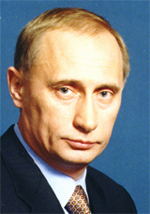Corruption, Democracy, and Identity in Russia 18 years, 8 months ago by Martey Dodoo

Sometime last spring, I had a minor argument with a friend about Russia. She claimed that Putin's increasingly authoritarian rule was necessary to confront the enormous wealth illegally acquired by the oligarchs who came to power after the fall of the Soviet Union. At the time, I attempted to defend my position based on the importance of political freedom, democracy, etc., etc. After reading this New York Times article, it occurred to me that I might been able to argue based on the fact that, Yukos notwithstanding, Putin does not really care about oligarchy or corruption.
Grigory A. Satarov, the president of Indem, said in an interview that the new growth of bribery fed off the inefficiencies of Russia's still sclerotic state structures, inherited from the Communist past.But he also blamed Putin policies that have weakened the rule of law. Fighting corruption, he argued, requires three conditions: free news media, a vibrant political opposition and a truly independent judiciary. Under Mr. Putin, he said, the Kremlin has undercut all three.
"The main thing," Mr. Satarov said, "is that all this time, Putin has not done anything to change the situation."
I worry about Russia's political future. While much was made about Russia's peaceful transition from communism to democracy in the 1990s, I think it is clear that the transition was incomplete. While one could condemn former President Boris Yeltsin for his failure to stop the oligarchs' plundering of Russia as my friend did, I would argue that Yeltsin committed a far worse crime when he picked Putin to be his political successor. Putin's acts of political consolidation will have a dramatic effect on Russia's future.
While the Soviet Union is gone, the Russia that has replaced it looks very similar. This includes both unsubstantial matters like its national anthem (which has the same melody as the one used during Soviet times) to more important issues, like Russian relationships with its neighbors (friendly with repressive regimes like those in Belarus and Uzbekistan; threatening toward democratic countries like Georgia and Ukraine) and its internal cultural climate that represses both political and social dissent, two of the most important elements of a liberal democracy.
However, it would seem that many Russians either do not see the difference or do not care. A couple of days ago, I was watching Superhomes: Moscow on the Discovery Times channel. The main focus of the episode was a Russian multimillionaire who had constructed a house with furnishings as opulent as Versailles. Just as ostentatiously as any King Louis, he had covered the walls in gold leaf and classical paintings with himself and his family as the main characters. He seemed to be trying to impress the camera and the show's American audience, quoting the prices for his "Rolls Royce" shower ($18,000), expensive clothes, and over-the-top decor in American dollars. In one scene, he soberingly described how he had to leave the Communist Party for "being too rich." He claimed that the Communists wished to "live for others" while he wanted to "live for himself," in typical capitalist fashion. After revealing that he felt ashamed about this, he continued the tour of his home. The scene made clear the essential conundrum of modern Russia. Despite its subconscious urge to be just like the affluent United States, with its supermarkets and mega-malls, a place where every citizen "lives for themselves," the country has only succeeded in becoming a weak shadow of the Soviet Union.
All countries need a "national myth" to thrive. For the United States, it is a strange mix of communal freedom and personal liberty, as highlighted in the "spirit of 1776," the American West of Frederick Jackson Turner, and even the sometimes hypocritical policies of our current president. The national myth of the Soviet Union was the concept of a socialist paradise, where neither social standing nor ethnicity would matter. As perestroika liberalized the Soviet economy, this myth collapsed. Had Russia become a democracy in the post-Soviet aftermath, it is possible that a new myth (concerning government of the people, by the people, for the people, etc.) would have come into place. Instead, there is nothing, which has led to widespread social problems.